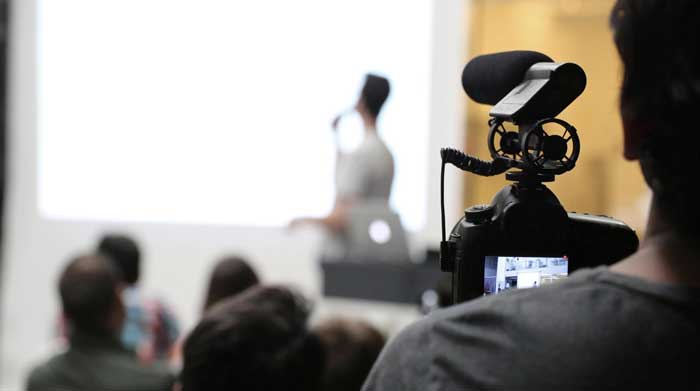Cynthia Kyofuna manages communications at Outbox in Uganda.
If you are a communications professional, I am sure you have come face to face with events and the request to have journalists from different media outlets attend.
In the face of an event, every company is always wondering how they can make the best out of the opportunity to build their visibility, and improve the sentiments around their brand.
Organizing an event can be intense especially because you are handling every aspect from the guest-list, agenda, invitations to your stakeholders, digital marketing for your event, drafting a press release, managing your partners and sponsors, and ensuring that journalists come to your event.
In this article, I will share what you need to consider as you plan to invite journalists to your event. It takes a whole load of intentionality but even when it is chaotic, I would like to encourage you that it will work out.
Steps on how to successfully hold an event with media present.
Plan your event
Before you invite the media, it is important to plan your event to the tiniest detail. You must understand, what your event is about, why do you need media, how many people will attend? What national dignitaries will be present – this is important because in the Ugandan context, phones and cameras are not allowed if you are going to host high-level dignitaries like the President or his First Lady.
Planning your event will give you insight on why you need media in attendance or if you require certain clearances for your media people.
What kind of event is it?
Knowing the industry that your event is addressing is important because then you are able to invite stakeholders including the media that will add value to your company – telling the story from an informed perspective because they major in that particular industry/topic.
After you’ve planned your event, you have probably come to the realization that it will tackle things in health, or transportation or education or environment etc. Knowing the industry that your event is addressing is important because then you are able to invite stakeholders including the media that will add value to your company – tell the story from an informed perspective because they major in that particular industry/topic.
Inviting media personnel relevant to your sector is important because they will not mix the facts up, and will be writing your story from a passionate point of view. These journalists will also share your story to other stakeholders relevant to your industry.
Organize a Media List
Do not leave the attendance of the media to chance. From the get-go, you must have a list of journalists that are loyal to your brand. Journalists that are equally loyal to their profession.
Having a media list with the name of the journalist, their media outlet and contact information is important because it allows for you to invite them beforehand, track their RSVPs, and equally update them on what your company is doing at a particular time.
I have noticed and equally fallen prey to random “journalists” from unknown media outlets showing up at my events uninvited. They then expect the same perks as those that were invited. Twice, I tried to deny them access, but the more efficient way is to have a media list of all the journalists you invite to your event. This way, anyone that “flukes” your event uninvited is shown the door right away.

Prepare a press release or areas of interest that you’d like the journalists to derive their stories from.
A press release is an official statement delivered to journalists/media houses for the purpose of providing information, creating an official statement, or making an announcement directed for public release. Press releases are also considered a primary source, meaning they are original informants for information.
Alot is usually happening at an event that journalists are more likely to deviate from the actual reason they were invited. Having a press release helps you to control the narrative, protect your brand and provides the foundation for news. It is therefore important to prepare a press release before your event or keep on updating it during the event so that it is ready by the time the event ends/at the agreed time journalists should leave.
Follow-up on your stories with News Editors
Your event story is most likely going to appear in the news that evening, especially on TV – and it should because beyond that day, it is stale and will not appeal to the editor as much as it would on the day of your event. Which is why it is important to have a conversation with an editor as well so that they are able to supervise the journalist, consider if your event or launch or product is newsworthy and if it is not, what options are available.
Leveraging the media for your events will place your company among any country’s household names and a thought leader for your industry. This is so because whoever controls the media controls the narrative. But also because navigating the media is tricky business especially because there are over 20 events happening in Kampala everyday. What makes you stand out is what you should find out if you must make the cut.
Overall building relationships with journalists is important overtime. These relationships open opportunities for your brand to outshine the rest – even better if your company/organization has a unique value proposition.
I hope this article helps you navigate having media at your next event.
If you need help with inviting media, writing press releases, training your team to become media smart, write to me on cynthiakyofuna@gmail.com






One Response
As someone who is keen to branch out to core PR, this is very informative read. Thank you